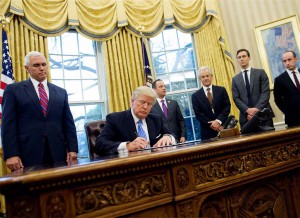The clash now looming between the federal government and the State of California about fuel-economy standards for new vehicles is raising the possibility automakers one day might have to build two different sets of the same vehicles for various parts of the nation.
Automakers have complained that the Obama administration imposed the current fuel economy standards just before the inauguration of President Donald Trump, saying the standards needed review in light of market forces and the state of current technology.
Car companies have also said they would like a compromise between Washington D.C. and California. With the EPA set to roll out a new set of proposed standards, compromise is unlikely.
For one thing the Trump administration now wants to roll back the standards substantially, while California and its allies in a dozen other states in the West and Northeast want no part of the proposed changes.
(Study finds strong support for keeping tougher fuel economy rules. Click Here for the story.)
“Fuel economy standards enjoy majority bipartisan support, even among Trump supporters, because they save families thousands of dollars at the pump through 2025 and are creating much-needed jobs across the country,” noted a statement signed by pro-standard groups such as Consumers Union, Ceres and CalStart.
In addition, since Trump took office in January 2017 other nations such as China, India and the European Union have moved to adopt tougher emission standards for new vehicles.
The new standards from outside the U.S. put added pressure on carmakers to reduce vehicle emissions, particularly since major cities such as London and Paris are calling for bans of internal combustion engines by 2040.
(Click Here for more about business groups seeking to keep tougher fuel-economy standards.)
The global pressure, particularly from China, the world’s largest car market, is certain to split the industry’s unified front in opposition to the tough California standards.
Moreover, following the lower standards suggested by Trump’s EPA could render carmakers, particularly U.S. companies such as Ford, General Motors and even Fiat Chrysler Automobiles. N.V. with its big Detroit-centric Chrysler unit uncompetitive in future, experts have suggested.
Automakers do not want to build two sets of cars, for sure, said Jessica Caldwell, director of industry analysis at Edmunds.com.
(California wants 5 million zero emission vehicles on roads by 2030. Click Here for the story.)
Moreover, the EPA and California could be locked in court for years over the expected plan to scale back mileage targets that the Obama administration with the State of California’s approval. A lengthy court battle may end up with the current standards remaining in place since under current court rulings the Trump administration cannot unilaterally alter them.

